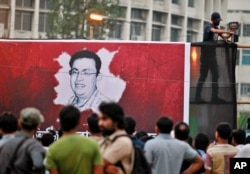The Islamic State has claimed responsibility for this week’s attack on an Italian missionary in Bangladesh, the latest in a string of attacks targeting foreigners and Bangladeshi secularists.
The missionary was wounded by unknown gunmen in the northern Bangladesh district of Dinajpur Wednesday. A day later, the U.S.-based SITE Intelligence Group, which monitors online activities of radical Islamic groups, reported that Islamic State (IS) had claimed responsibility.
Islamic State also claimed credit for killing an Italian aid worker in late September and a Japanese citizen in October.
Between February and October four secular bloggers and one publisher were hacked to death in Bangladesh. According to police, they were murdered by Ansarullah Bangla Team (ABT), a local hard-line Islamist outfit.
However, the government of Bangladesh vehemently denies that Islamic State or any international terrorist organization has any foothold in the country. Instead, officials claim that ABT and the opposition alliance led by Khaleda Zia’s Bangladesh Nationalist Party and its ally Jamaat-e-Islami have been behind all of these attacks.
Hit list
With the accusations of a political conspiracy aimed at embarrassing the government, and few arrests by police of the militants accused of taking part in the attacks, critics say there is a culture of impunity taking hold.
Suspected Islamists have released a so-called “hit list,” naming 34 secular Bangladeshi authors, journalists, bloggers, teachers and others as targets for their alleged anti-Islam activities.
Some of those named say that they do not fear being killed and unlike other threatened bloggers and activists, will not move out of Bangladesh. They say the death threats will not succeed to deter them from their usual writing and other activities.
Some others say, they are indeed frightened to receive the death threats. They say because police have been unable to provide them security, they have no other option than to flee the country.
Islamist group Ansar al Islam (AAI), which claims to be the Bangladesh wing of al-Qaida in the Indian Subcontinent (AQIS), an affiliate of al-Qaida, and is believed to have been behind a series of killings of secular bloggers in the country, released the list online last week, along with a statement.
“An identified list of Bangladeshi activists, blogger and intellectuals in worldwide who promote anti-Islamist group [sic]. They must die. Our All Mujahedin, this is our duty to slash their head,” read the statement titled “Who’s Next.”
Signed off by Mufti Abdullah Ashraf, who claimed to be a spokesperson of Ansar al Islam, the statement added that “innocent Hindus, Buddhists, Christians” would not be targeted by the group.
The domestic group of ABT is behind last week’s hit list, said Muntasirul Islam, deputy commissioner of the media wing of the Dhaka Metropolitan Police.
“We are sure that the ABT has been using the name of Ansar al Islam recently while issuing such hit lists and claiming responsibility following violent attacks. It’s a domestically raised group having no connection with al-Qaida or any other international Islamist group, our investigation has found,” Islam told VOA.
“Our team has already hit the ground looking for the people who have issued the latest hit list. We will trace them out soon,” he said.
History of threats
Hit lists threatening mostly Bangladeshi bloggers had been issued at other times in the past. However, in the latest list, the Islamists have broadened their targets by including well-known authors, journalists and supporters of Bangladesh’s ongoing trial of crimes related to the country’s 1971 war of independence.
Popular Dhaka-based author Professor Muhammed Zafar Iqbal said more killings could result if the authorities fail to make progress against the militant groups.
“They say, they target those who write against Islam. I never wrote one sentence hurting anyone's religious sentiment. Yet, I am in the latest hit list because I speak in support of Bangladesh's war for liberation and the related war crime trials,” Prof Iqbal said to VOA.
Pro-war crime trial activist Shammi Haque is one among the 34 who have been named in the latest hit list.
“Since 2013, they killed almost a dozen bloggers and activists. Since the killers are virtually going unpunished, they are boldly issuing such open threats and launching violent attacks on their targets,” Haque said to VOA from Germany, where she moved last month.






